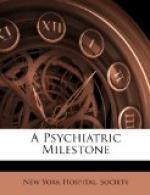It is, in the first place, to be observed, that in most cases of insanity, from whatever cause it may have arisen, or to whatever extent it may have proceeded, the patient possesses some small remains of ratiocination and self-command; and although many cannot be made sensible of the irrationality of their conduct or opinions, yet they are generally aware of those particulars for which the world considers them proper objects of confinement. Thus it frequently happens, that a patient, on his first introduction into the asylum, will conceal all marks of mental aberration; and, in some instances, those who before have been ungovernable, have so far deceived their new friends, as to make them doubt their being insane.
It is a generally received opinion, that the insane who are violent, may be reduced to more calmness and quiet, by exciting the principle of fear, and by the use of chains or corporal punishments. There cannot be a doubt that the principle of fear in the human mind, when moderately and judiciously excited, as it is by the operation of just and equal laws, has a salutary effect on Society. It is of great use in the education of children, whose imperfect knowledge and judgment, occasion them to be less influenced by other motives. But where fear is too much excited, and especially, when it becomes the chief motive of action, it certainly tends to contract the understanding, weaken the benevolent affection, and to debase the mind. It is, therefore, highly desirable, and more wise, to call into action, as much as possible, the operation of superior motives. Fear ought never to be induced, except when an object absolutely necessary cannot be otherwise obtained. Maniacs are often extremely irritable; every care, therefore, should be taken, to avoid that kind of treatment that may have any tendency towards exciting the passions. Persuasion and kind treatment, will most generally supersede the necessity of coercive




